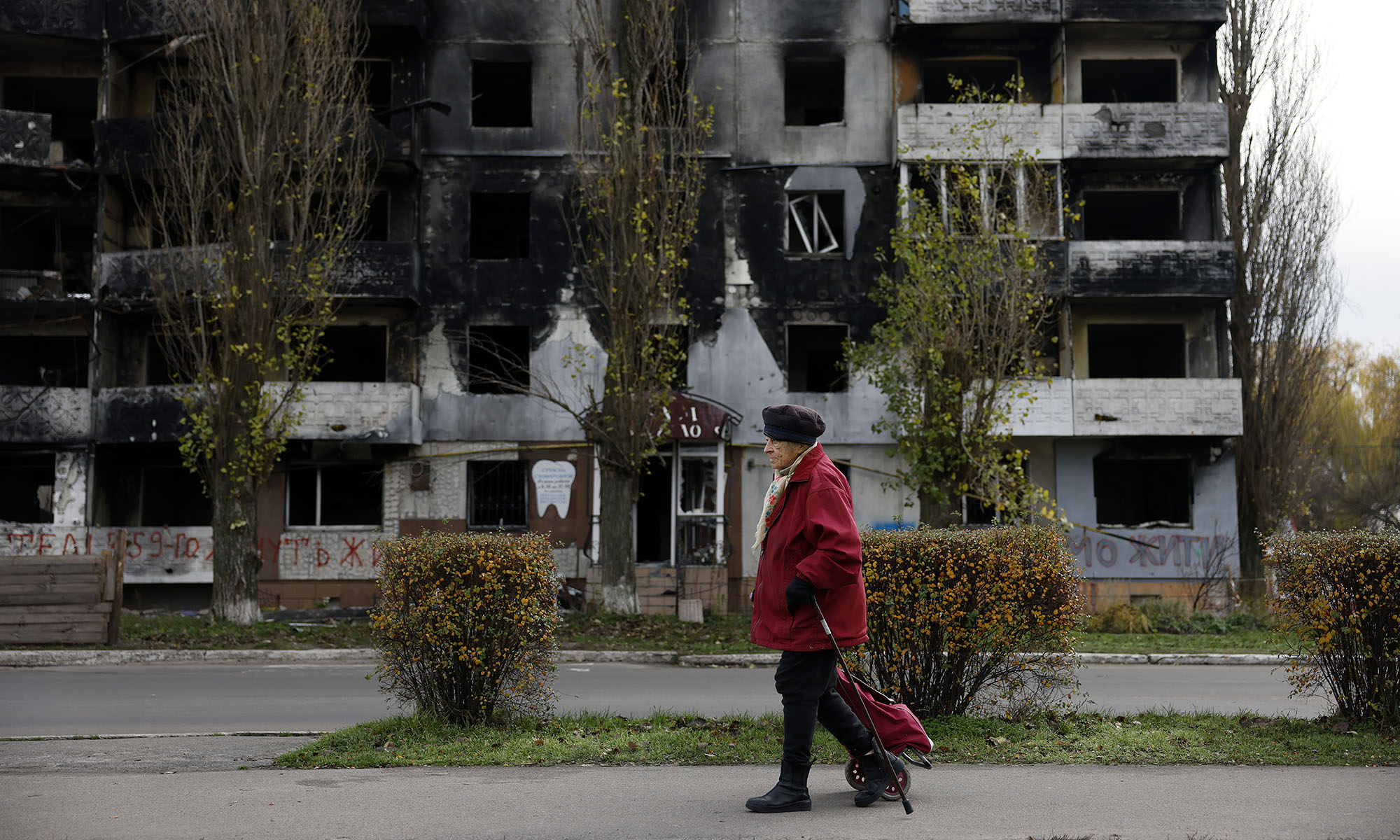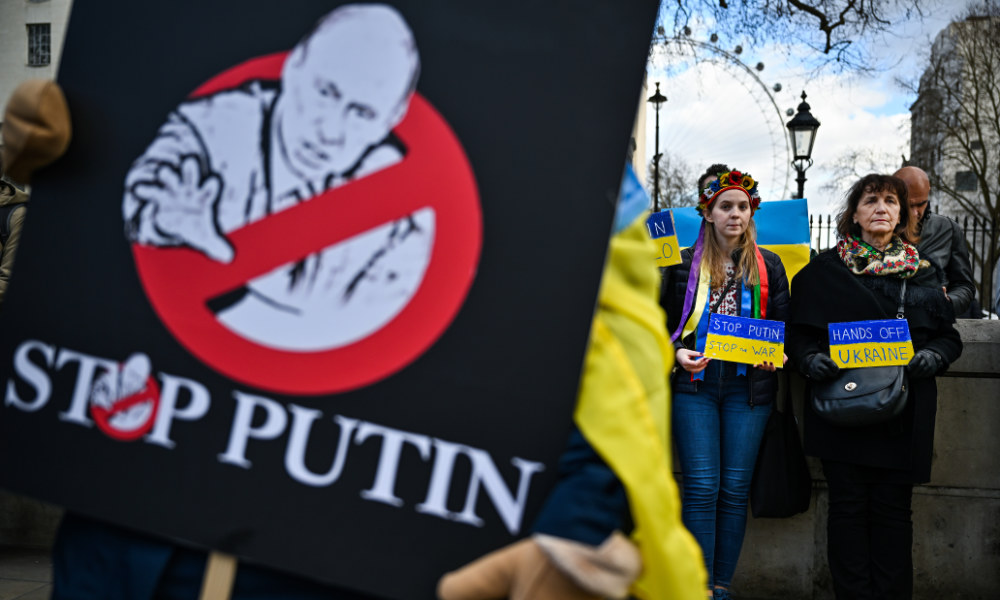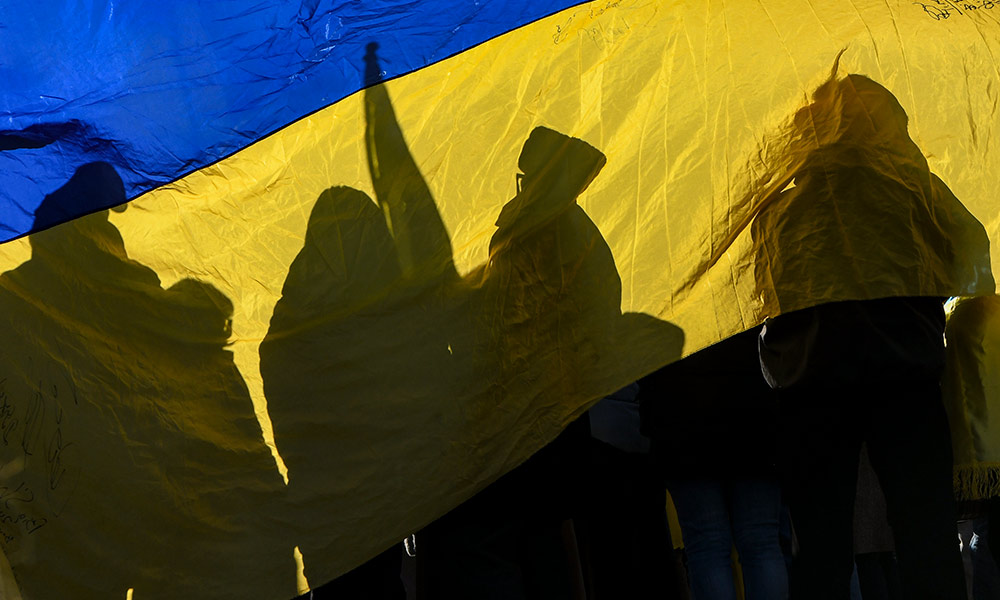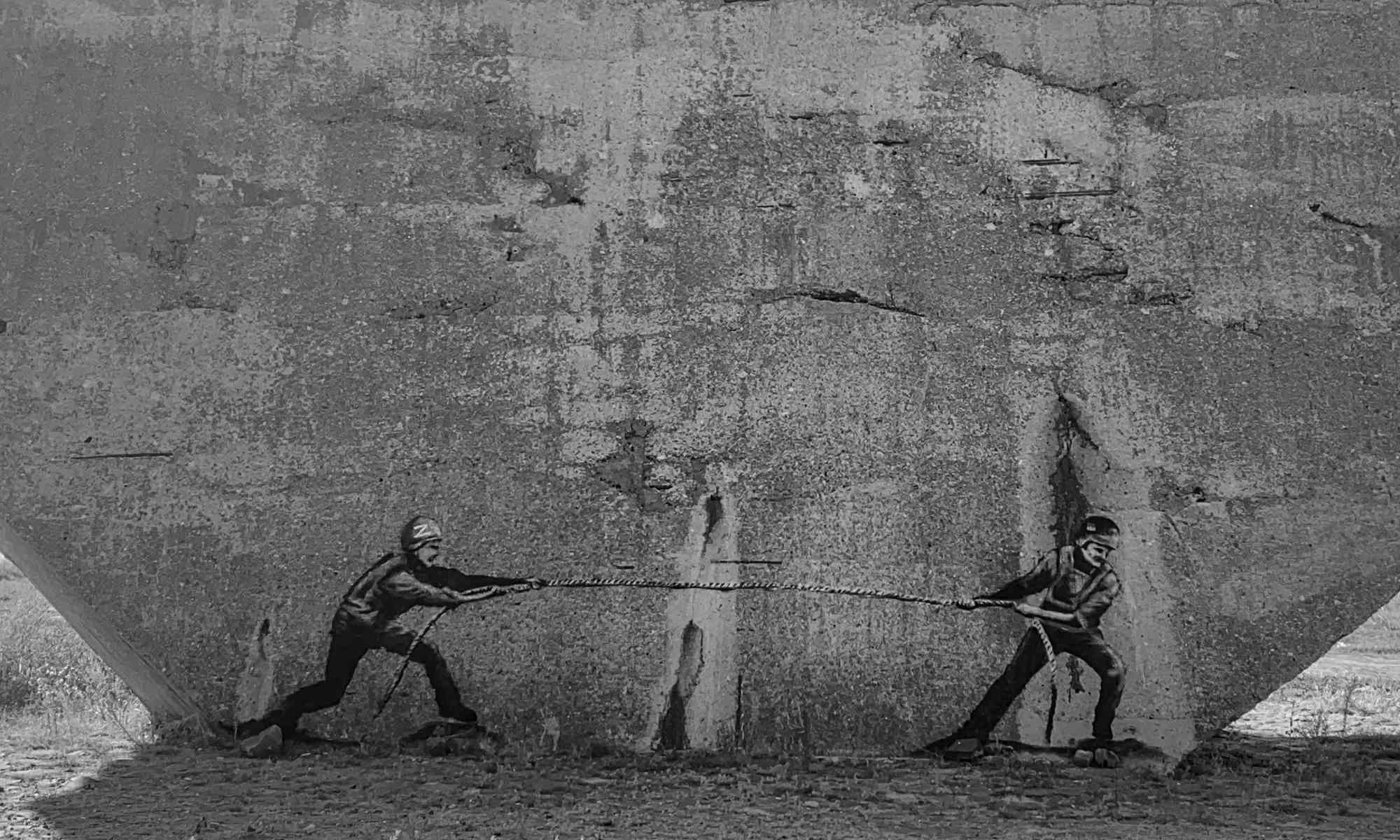University of Rochester political scientists discuss military developments, the efficacy of sanctions, and how to end the war.
A year ago, on February 24, Russia invaded Ukraine, marking a major escalation in a long-smoldering armed conflict that began in 2014 with Russia’s annexation of Crimea. In the past year, several hundred thousand soldiers have been killed on both sides, and the conflict has created Europe’s largest refugee crisis since the Second World War.
On February 21, 2023, President Joe Biden marked the anniversary with a surprise visit to Ukraine. Hein Goemans, a professor of political science at the University of Rochester and the director of the Peter D. Watson Center for Conflict and Cooperation, called the visit “a loud and clear signal to [Russian president Vladimir] Putin, and to the rest of the West, that the US is in it for the long haul.”
So, what is happening in Ukraine now? And when will the war end? Not soon, according to Goemans, an expert on how international conflicts begin and end. “If Putin left the stage, things could change quickly,” he says. “But we’re still in the informational stage of war, both sides are still trying new strategies.” For peace negotiations to start, “both sides must know, more or less, how the war would end for them.” And that could take from a year to a decade, he adds.
Randall Stone, a political science professor and the director of Rochester’s Skalny Center for Polish and Central European Studies, predicts the war will last at least another year.
Putin “is committed to continuing the fighting because ending the war without a victory is riskier to him politically than continuing,” says Stone. “He calculates that Russia’s immense resources will grind down Ukrainian resistance eventually, and presumably continues to hope that NATO will eventually tire of the conflict and pressure Ukraine to make concessions.”
Q&A with Randall Stone and Hein Goemans
SYMBOLISM, MILITARY TACTICS, AND STRATEGY
In the wake of Biden’s surprise visit to Ukraine, Putin suspended Russia’s participation in the New START nuclear agreement with the US. What do you make of that?
 Randall Stone, a political science professor and the director of the University of Rochester’s Skalny Center for Polish and Central European Studies, is an expert on international relations and has written extensively on Russia and Eastern and Central Europe. He is the author of Controlling Institutions: International Organizations and the Global Economy (Cambridge University Press, 2011), Lending Credibility: The International Monetary Fund and the Post-Communist Transition (Princeton University Press, 2002), and Satellites and Commissars: Strategy and Conflict in the Politics of Soviet-Bloc Trade (Princeton University Press, 1996).
Randall Stone, a political science professor and the director of the University of Rochester’s Skalny Center for Polish and Central European Studies, is an expert on international relations and has written extensively on Russia and Eastern and Central Europe. He is the author of Controlling Institutions: International Organizations and the Global Economy (Cambridge University Press, 2011), Lending Credibility: The International Monetary Fund and the Post-Communist Transition (Princeton University Press, 2002), and Satellites and Commissars: Strategy and Conflict in the Politics of Soviet-Bloc Trade (Princeton University Press, 1996).
Listen to Stone discuss US policy toward the war in Ukraine on the February 8, 2023, edition of Connections with Evan Dawson on WXXI, Rochester’s NPR affiliate.
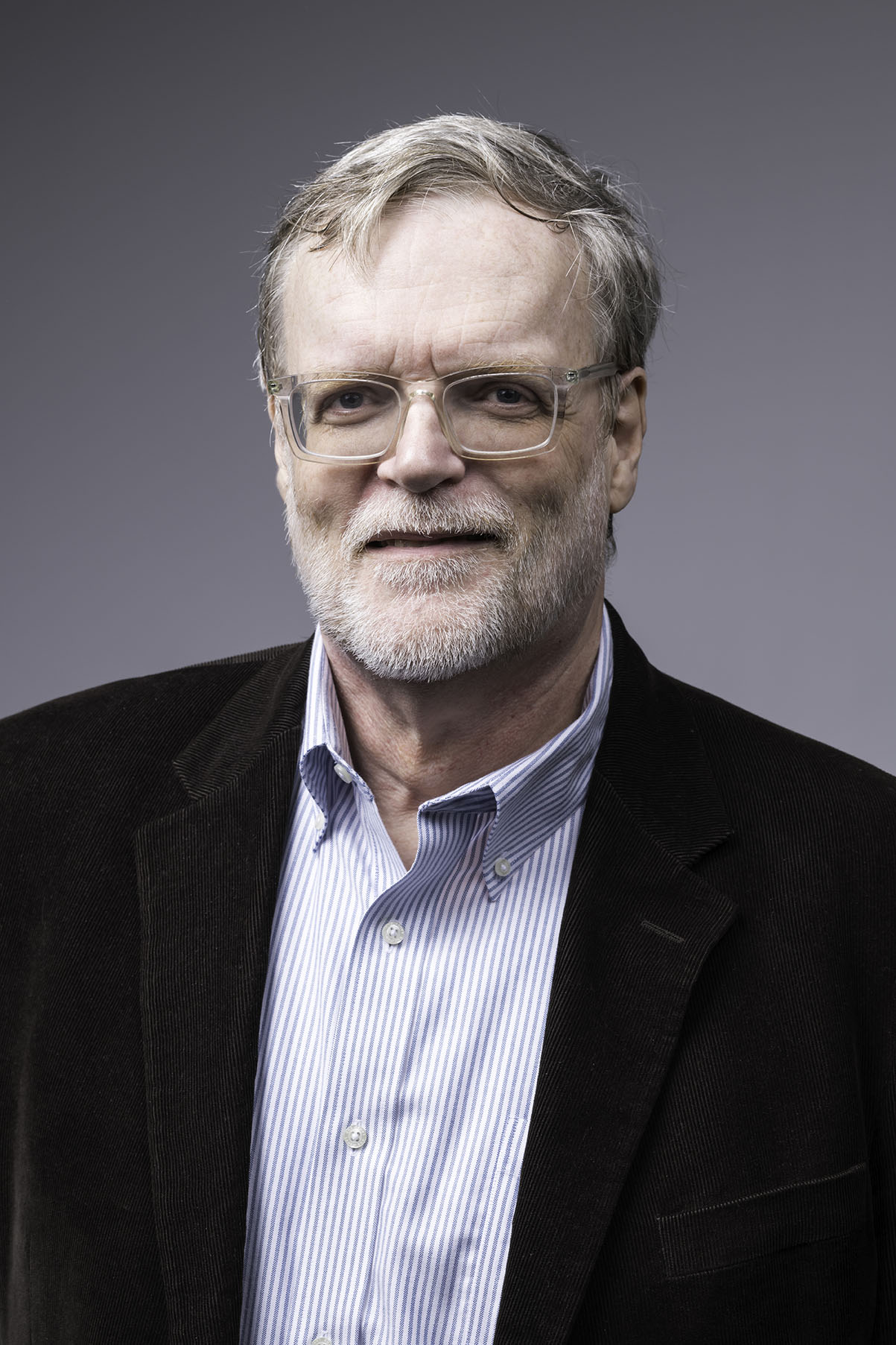 Hein Goemans, a political science professor and the director of the University of Rochester’s Peter D. Watson Center for Conflict and Cooperation, is an expert on international conflict—how wars begin and how they end.
Hein Goemans, a political science professor and the director of the University of Rochester’s Peter D. Watson Center for Conflict and Cooperation, is an expert on international conflict—how wars begin and how they end.
He is the author of War and Punishment: The Causes of War Termination and the First World War (Princeton University Press, 2000) and coauthor of Leaders and International Conflict (Cambridge University Press, 2011).
Listen to Goemans on the February 16, 2023, edition of the Financial Times podcast, the Rachman Review, as he addresses the question: how long will the war last?
Goemans: The suspension from the nuclear agreement is Putin engaging in some saber-rattling. At the same time the Russian Foreign Ministry explicitly wrote that Russia will continue to abide by the treaty’s provisions.
Stone: The personal risk that Biden took should go a long way to remove any lingering doubts on the Russian side and among our allies about US resolve in this crisis. Putin responded by suspending the nuclear arms limitation treaty, which was one of the major accomplishments of the restart in US-Russian relations under President Obama. Russia doesn’t have the capacity to engage in a new nuclear arms race at the moment, but Putin is trying to match symbolism with symbolism.
NATO members, including the US, are sending tanks to Ukraine. Will it make a difference?
Stone: The decision is strategic rather than tactical. I don’t think the numbers of tanks currently promised will be decisive militarily, and it will take months to train Ukrainian crews to operate and service them and to use them effectively in combat. So the effect won’t be felt this winter or spring. In practical, on-the-ground terms, the most important support that NATO has provided has been defensive weapons, logistical support, and intelligence.
But delivering tanks is one of the strongest signals NATO could send to show it’s committed to supporting Ukraine for the long haul. It shows NATO isn’t deterred by the prospect of Russian escalation and is willing to spend the resources necessary to defeat Russia militarily.
Russia’s main hope for victory is that the NATO alliance splinters and pulls back its support for Ukraine. The conflict will continue until most of the sources of uncertainty have been resolved, and the decision to send tanks helps to resolve one of the most important uncertainties.
Goemans: Yes, sending tanks is a signal that the broader international coalition will keep standing behind Ukraine, and that may be the most important thing at the moment. I do, however, think the tanks will make a difference in the spring offenses. That’s provided they have air cover. I think it’s very likely that President Biden will send F-16 jets to Ukraine, despite what the administration is saying now. Having air cover means that the tanks that have been promised could advance more quickly and safely, interdicting Russian lines of communication and supplies. A single tank with air force coverage is equivalent to 10 tanks. The US has promised to send long-range bombs, which may be just to tide the Ukrainians over until Ukrainian pilots can get trained for US fighter jets.
Do you worry that sending high-tech military equipment to Ukraine will escalate the war?
Goemans: I have read that from some pundits, and it concerns me. Let me put this politely: it’s rubbish and then some. Let’s remember the facts: Putin keeps escalating, sending conscripts and mercenaries, targeting civilians and the power grid. Ukraine is merely trying to keep up and defend itself.
Are Russia’s attacks on civilian targets succeeding in undermining Ukrainian morale?
Stone: No, there doesn’t seem to be much chance that Putin’s apparent strategy of bombing Ukraine into submission will work. The human capacity for suffering is almost unlimited, and historical examples suggest that aerial bombardment makes civilian populations more resistant rather than less. In fact, Putin seems to be repeating the mistake Hitler made when he diverted German air attacks from military to civilian targets in 1940.
Goemans: This is the mistake that everybody keeps on making, since even before the Second World War. The idea is to target what’s supposed to be the Achilles heel—the civilian population—and to destroy their morale by bombing everything and everybody to smithereens. But it has never worked. And it’s not working now. Why? Because it just creates a counter reaction.
Russia’s mercenary soldiers, the so-called Wagner Group, have been making gruesome gains in the Donetsk region. What’s Putin’s strategy here?
Goemans: Using these mercenaries is a humiliation. Maybe not for Putin himself, but a humiliation for the Russian state. I mean, the rest of the world is shocked by the corruption of the Russian system, which is just mind-boggling.
Stone: Relying on the mercenaries really reveals Russian desperation. Putin’s political brand is about order and domestic security, including being tough on crime. So releasing Russian felons from prison in return for contracting as mercenaries is very costly to him politically. It’s also embarrassing that an informal mercenary group seems to be more effective than the regular Russian army. It’s been interesting to see Putin’s ally Yevgeny Prigozhin, who owns the Wagner Group—and who masterminded the intervention in the 2016 US elections by the Internet Research Agency, or Glavset—emerging from the shadows to claim credit for Wagner’s advances, sometimes upstaging the Russian Defense Ministry. This seems like a risky move, but it may indicate that his position is stronger than previously believed.
How likely are nuclear or chemical attacks by Russia at this point?
Stone: Both are extremely unlikely, but nuclear options play an important role in everyone’s calculations. Chemical attacks, on the other hand, were never a practical option. Chemical weapons aren’t very useful on a battlefield; they’re only effective as a brutal way of attacking civilians. The international revulsion at the use of chemical weapons is so great that using them would risk isolating Russia from its remaining allies, provoking renewed anti-war protests in Russia, and convincing NATO to intervene directly in the war.
Nuclear threats are Putin’s strongest resource—and the main reason NATO has not directly intervened. At each cautious step in the escalation of support for Ukraine, NATO has calculated the risks that Russia would escalate to nuclear war. It seems likely that Russia would use nuclear weapons if the United States entered the war, probably against NATO bases in Europe. Nuclear deterrence would be Russia’s only way to prevent military defeat if the United States brought its conventional forces to bear, and defeat would threaten Putin’s hold on power in Russia.
Yes, it’s conceivable that Russia might use nuclear weapons against Ukraine if Putin becomes sufficiently desperate. But that doesn’t seem to be a winning strategy. There are no Ukrainian military targets valuable enough to be tempting, and battlefield use of nuclear weapons is not terribly effective.
Goemans: I also don’t see the threat of a nuclear escalation right now. That could change if Putin is cornered, if the Ukrainians push through Crimea, for example. In that case Putin might still want to use nuclear weapons to scare the rest of Europe into withdrawing support from Ukraine. But it wouldn’t be a tactical weapon used to win on the battlefield.
I agree with Randy—if the Russians decided to use chemical weapons, India and China would decisively turn against them as well. The majority of the world is against Russia already and that would tilt the holdouts. Interestingly, though, the Russians actually built armored infantry vehicles and other military equipment to withstand chemical and biological weapons. The West, meanwhile, did not.
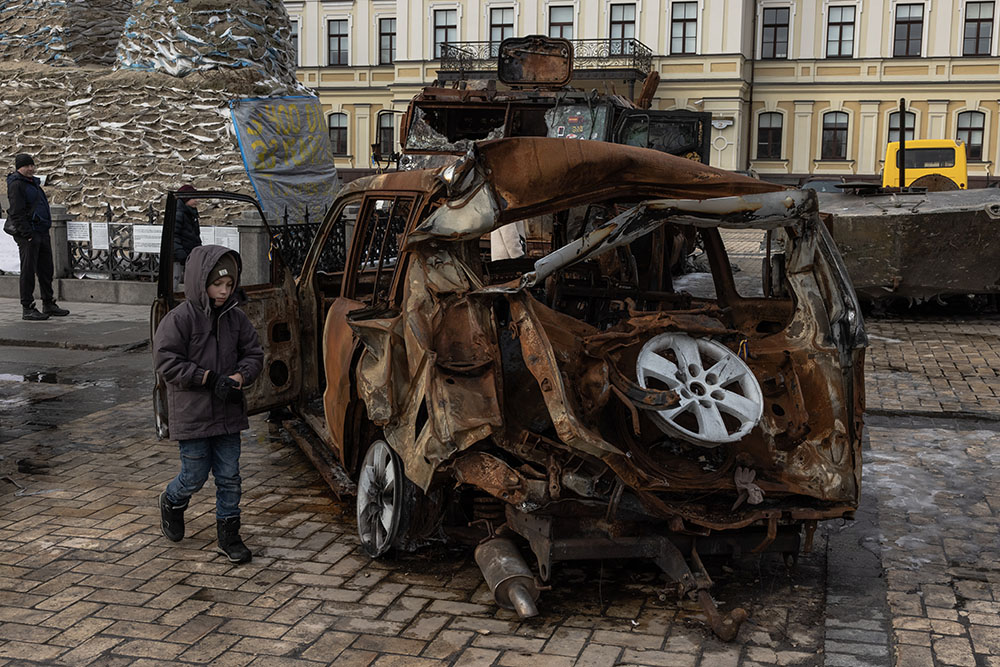
SANCTIONS
Ukraine’s President Volodymyr Zelensky has been demanding more sanctions against Russia. What’s left?
Stone: The effectiveness of sanctions depends on how reliant the target is on international trade and whether its trade partners cooperate with sanctions that deny the target access to its markets. The main step the West could take to strengthen sanctions would be to broaden them to include countries that have helped Russia to evade them—particularly Russia’s allies in the former Soviet Union such as Belarus, Armenia, and some of the Central Asian countries, including Kazakhstan. China has helped Russia to a degree but has been very cautious because it doesn’t want to burn bridges with the West. So sanctioning China at this point would be counterproductive. The Biden administration has been warning China publicly not to provide weapons to Russia, which indicates that the administration believes this might be likely. That would be a global escalation of the conflict. If Chinese support for Russia became substantial enough to affect the outcome in Ukraine, NATO would probably impose multilateral sanctions on the Chinese economy, which could cause a deep global recession.
How effective have sanctions been so far?
Stone: The initial sanctions last spring were very effective in cutting Russia off from international trade and financial networks. Probably the biggest impact of those sanctions was stopping the flow of military and dual-use technology and equipment to Russia, which made it difficult for Russia to replenish its stocks of missiles and to service its air force. Large numbers of Russian planes are reported to be out of service, and Russia cannot replace the missiles that it’s been firing at Ukrainian civilian targets because it doesn’t produce sophisticated microprocessors.
Of course, the sanctions were really meant to drastically cut Russia’s export earnings, making it difficult for Putin to finance the war. They failed to do that because, as we all saw, the uncertainty created by the war caused oil prices to soar. Now that oil prices have essentially returned to their prewar levels, Russia may soon begin to feel the pinch.
Last December, the Group of Seven (G7) nations imposed a $60 per barrel price cap on Russian oil exports. Was that effective?
Stone: I think so. US Treasury Secretary Janet Yellen proposed this innovative approach, which is possible because most Russian oil exports rely on Western shipping and insurance. There are reports that Russia is selling its oil at higher prices to countries that aren’t participating in the sanctions, and illegally pumping oil from ship to ship on the high seas to evade the cap. Either way, though, evading the sanctions pushes the price that Russia can demand below the world market price.
CONTAINING—AND ENDING—THE WAR IN UKRAINE
How high is the risk of the war’s spreading?
Goemans: To me, the biggest question right now is whether Belarus will join Russia. Right now, they’re allowing Russia to operate from their territory. But are the Belarusians willing to send their own troops? There’s some noise about Putin’s readying the army for another attack on Kyiv but the Russian generals don’t want to do it, because they think it won’t work and will cause a bloodbath for them. Putin might want to try instead to force Belarus’s dictator [Alexander] Lukashenko to undertake this attack with Belarusian troops.
Stone: The biggest risk of spillover is when Putin becomes desperate and tries to escalate against NATO allies in an attempt to try to convince them to stop supporting Ukraine. I think that risk is receding. Before the war, Russian elites were very skeptical of US assurances that it would honor Article 5 of the NATO charter and go to war if Russia attacked a small NATO ally such as Estonia or Latvia. US determination to support Ukraine, even though it’s not a NATO member, and the risks that it has run by escalating that support, have likely convinced Russian analysts that the United States is serious about defending NATO allies. US policymakers have seen support for Ukraine as a test of US credibility, and efforts to defend Ukraine as deterring Russia from challenging our NATO allies.
Does the US have a clear strategy, and if so, what is it?
Goemans: Well, the original strategy used to be, “We’re not going to let Ukraine lose.” And now it may be shifting to, “We’re going to ensure Ukraine wins.”
What that seems to boil down to is this: the war has to come at a significant cost to Russia so that it will learn its lesson and not violate the territorial integrity of another country again. And that means driving the Russians back. How far? I don’t know, but I’d say at least to the territory before the invasion began on February 24, 2022.
Stone: The US strategy is two-fold: to strengthen Ukraine so that it can defeat Russia without provoking an overt military clash between NATO and Russia; and to work closely with our allies so that this conflict strengthens the NATO alliance rather than undermining it.
I don’t think the US strategy depends on where the territorial boundaries of Ukraine are ultimately drawn, but it will be more successful to the extent that it denies Putin any substantial gains from the war. The US has not committed to a position on whether Ukraine will be admitted to NATO, but I think it’s very likely that Ukraine will become a member.
What will it take to end the war?
Stone: Putin is committed to continuing the fighting because ending the war without a victory is riskier to him politically than continuing. He calculates that Russia’s immense resources will grind down Ukrainian resistance eventually, and presumably continues to hope that NATO will eventually tire of the conflict and pressure Ukraine to make concessions. He may hope that nuclear threats will shake NATO’s resolve. Thus, both sides have reasons to think that time may be on their side. The biggest uncertainty in the equation is NATO cohesion. At this time last year, no one would have expected NATO to intervene as decisively as it has in the conflict.
War continues until the uncertainty that motivates it is resolved, so this conflict will continue until Ukrainian and Russian expectations converge, and this mainly depends on the ability of the West to clearly signal its intentions.
Goemans: The war is still in what I call the informational stage of war, which means both sides are collecting information about how strong the enemy really is, versus just posturing and bluffing. During that stage you learn things about the other side, about outside actors, and yourself. It’s cards on the table. Ultimately, only by going to war can one find out which countries or alliances are willing to come to your aid.
Of course, during this stage both sides have plenty of incentives to try to bluff and to try to manipulate information, in order to scare the enemy into initiating the bargaining stage of war, which would then lead to peace negotiations. During the informational stage, each side is continuously reassessing, not just the strengths of the opponent but also their own capabilities. Russia, for example, found out the hard way that its tanks were in poor condition, and that its soldiers were ill-prepared.
As long as this informational phase lasts—and that can be years—neither side is willing to make a deal.
Sometimes a war is very short because one side reveals a strong strategy, a new weapon, or brilliant tactics and the other side concludes rather quickly that it cannot match that, has clearly miscalculated, and has more to lose if the war dragged on. That’s when peace negotiations start. But that’s not the case here. We know that the Russians miscalculated when they thought that Ukraine was weak. So they had to adjust their expectations accordingly and accept that this wasn’t going to be a swift war.
There’s another problem to finding a peace settlement, which I call a commitment problem. Few believe that Russia would be satisfied with a settlement in which Ukraine ceded just a little bit of territory to Russia. What would prevent Russia from waiting three or five years while it rebuilt its army and its weapons and then coming back for more? Nothing short of Ukraine’s joining NATO might protect it in the long run, but ironically that’s why Russia went to war in the first place. By agreeing to a settled peace now, Ukraine might very well find itself in a worse position a few years down the road.
Lastly, some leaders simply can’t settle because doing so would mean their political and, quite possibly, physical death. There’s disagreement among Russia experts over whether Putin is internally strong enough to survive a peace settlement with Ukraine. If Putin thinks he’s in jeopardy at home, he’ll keep on fighting. In international relations theory we call that gambling for resurrection.
Is there anything that Putin could sell as a victory at home?
Goemans: There’s fighting around Bakhmut. Putin will also want to reach the borders of the administrative units of Donetsk and Luhansk and the whole southern area along the Black Sea. He might be able to sell this as a victory to the Russian people, but it would be a very costly victory. Meanwhile, the Ukrainians are not willing to settle. They think they’re strong enough to force the Russians out of some of these areas. The Ukrainians believe they can get a better deal. And historically, of course, we all know that appeasement doesn’t work.
Ideologically, Russia would also need to fundamentally reorient its identity that considers Ukraine an integral part of Russian history. Ukraine has made it very clear that it disagrees and doesn’t want to have any part in any Russian empire.
How much longer will the war last?
Stone: I expect it to last for at least another year. Ukraine is politically united and determined to keep fighting, and with sustained NATO support is likely to make some gains on the battlefield. Ukraine has a qualitative advantage in terms of training and morale, and it is gaining a technological edge over Russia as it assimilates NATO weapons.
Goemans: I agree, the war will last at least another year. But three to four years are also a possibility, maybe even a decade. If Putin left the stage, things could change quickly. But as I said, we’re still in the informational stage of war, and both sides are still trying new strategies. Ukraine is getting new weapons from the West and Russia is continuing to mobilize troops.
We’re not yet at the stage of negotiating for peace because for that to happen both sides must know, more or less, how the war would end for them.
Of course, we—the West—are prolonging the war by sending weapons and intelligence to Ukraine. If we didn’t, the war would be over much sooner, and Russia would simply move its borders eastward. Moldova, Latvia, Estonia, and Lithuania would be at risk. Of course, that would threaten the entire stability of Europe and we really don’t want that outcome.


